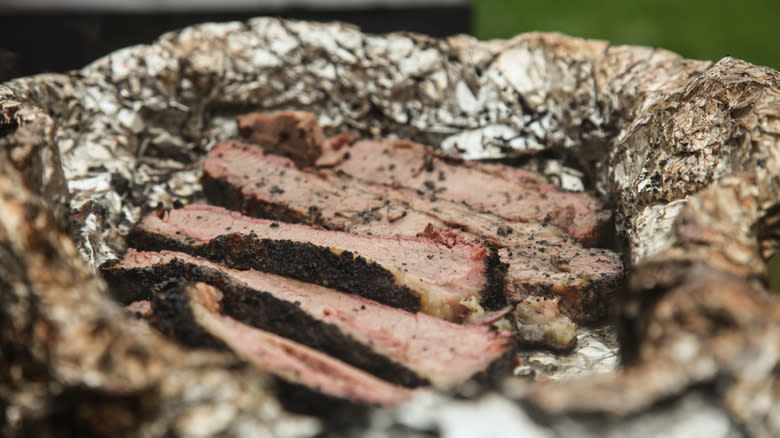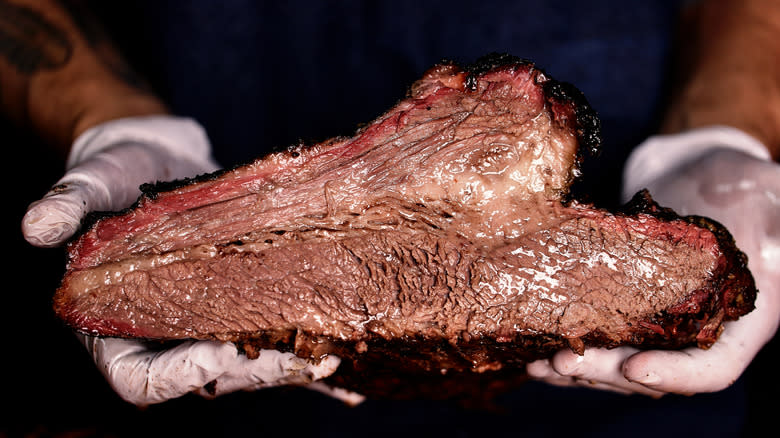What Are The Benefits Of Smoking Meat In Butcher Paper Vs Tin Foil?

Smoke is a weird substance. Sometimes, it's the scariest thing you can see, but other times, it's the key to a great dinner. Cooking with smoke is the foundation of a lot of BBQ, and not just because it smells amazing. It also enriches your food with the flavors of whatever wood you're using to produce that smoke. There are all sorts of tips chefs might tell you about smoking meat, like using less wood, obeying the 3-2-1 rule, and putting some thought into the type of smoke you're using.
There's another one a lot of chefs swear by: wrap your meat before you smoke it, either in tin foil or butcher paper. But when should you use tin foil, and when is butcher paper the better option? As it turns out, there are significant benefits to both materials. Using butcher paper helps to keep the food moist without damaging the crispy outer layer (crucial for brisket), while tin foil is faster and allows food to cook more evenly.
Read more: 11 Tips For Keeping Your Grill Shiny And Clean
Moisture Is Key To Smoking

When you cook any meat, it's going to release some moisture. Generally speaking, you want to minimize this as much as possible, because juicier meat is practically always better meat (this is also why resting your meat is so important). Many recipes from expert pit masters even advise you to mist your meat as you smoke it. Wrapping operates on the same principle, with the added benefit that you don't need to constantly be spraying your pork ribs. Instead, the wrapping traps the liquid and essentially braises the meat in its juices.
The downside to this method is that you're potentially introducing moisture into the process in unwanted ways. When smoking meat, the bark is important. That's the thick crust that forms on smoked meat and is made out of the spices you've rubbed on there combined with the chemical reaction that comes from the meat being exposed to heat and oxygen. Both tin foil and butcher paper will affect this bark, but tin foil can create a more dramatic change.
Butcher Paper Gets It Crispier, Tin Foil Gets It Juicier

If you're smoking meat in either foil or butcher paper, the bark will be somewhat less crusty than it would be when fully exposed to air -- that's just unavoidable. But it's far more affected by tin foil, given that butcher paper allows steam to escape more easily. Using tin foil typically isn't going to destroy the bark, but it will make it softer, which isn't generally what you want.
On the other hand, the fact that tin foil traps more moisture can be a good thing if you want the most tender meat possible. In addition, tin foil is far better at conducting heat than butcher paper, meaning it cooks meat faster and more evenly. The amount of time it saves varies depending on what you're cooking, but it will generally be faster than butcher paper.
So which should you use? It depends on what you're cooking. Butcher paper is better for something like brisket or beef ribs where you want a strong bark. If you're dealing with something like pork ribs or pork shoulder where you don't care about the bark nearly as much, but do care more about succulent meat, tin foil is the way to go. Ultimately, use the right product for the right situation and your next BBQ will be a great time for all.
Read the original article on Daily Meal.

 Yahoo Sports
Yahoo Sports 